News
How Pettah was turned into a ghost town by Customs strike
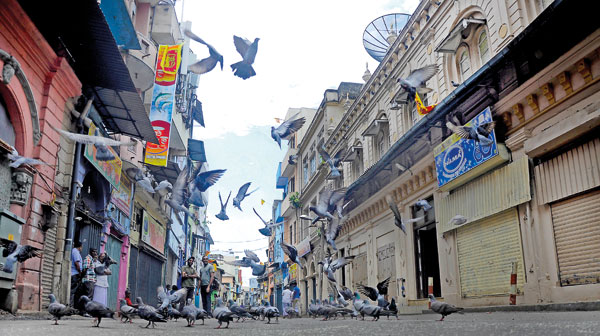
Pigeons have a field day in a deserted Pettah. Pix by Ishanka Sunimal
Mohammed Aleba, a 70-year-old driver from Badulla, spent three days in his lorry during recent trade union action by Customs officers, to make sure nobody dismantled its parts.
Mr Aleba couldn’t return home empty-handed. The fuel for a return trip costs around Rs 25,000. And if he didn’t go back to Badulla loaded with goods as he usually did, he would not earn enough for his family of seven.
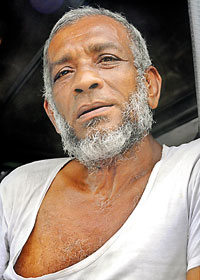
Mohammed Aleba
But the work-to-rule by Customs officers, compounded on Tuesday by a hartal by importers and wholesale merchants in Pettah, meant that, while some items such as perishables were available, the broad mix of products Mr Aleba usually took with him to Badulla was not. So he slept three nights in his vehicle, parked on Fifth Cross Street, swatting at mosquitoes and spending over Rs 1,000 on meals.
Five unions–the Customs Staff Officers’ Union, Superintendents of Customs Union, the Customs Officers’ Union, the Customs Inspectors’ Union and the Guards’ Union–carried out the work-to-rule which started on January 30 and ended on February 5. They were protesting against Finance Minister Mangala Samaraweera’s removal of Director General of Customs P. S. M. Charles. She was subsequently reinstated.
The work slowdown hit many across the board. On Tuesday, the day of the hartal, Pettah was deserted. Pigeons strutted along Fourth Cross Street. Porters idled on pavements awaiting the arrival of containers. Others played cricket. They had less work as fewer containers were coming in.
Nihal Nishan, a porter, felt wholesalers had no right to close their shops. The issue of contention was between Customs and the Finance Minister. It should have been sorted by them, he said. The porters, who were dependent on daily wages, were badly affected.
“We have no unions,” Mr Nishan said. “They don’t allow us to form any. What we earn is dependent on the quantity of goods we haul. I can’t even borrow because the capital and interest then comes out of our daily wage.”
Mohammed R Muzammil, 48, from Kandy has been a porter on Fourth Cross Street for nearly three decades. “I borrowed Rs 3,000 yesterday at 20 percent interest rate,” he said. “If I don’t get work by tomorrow, I can’t repay it or send money to my family.”
Politicians, officials and traders had good incomes or a monthly wage. Porters like him lived from day to day. “This is their problem,” he said. “Why are we being punished? They earn millions off our backs. But we are waiting in the streets like beggars today.”
Like Mr Aleba, many other drivers were sleeping in heavy vehicles on Fifth Cross Street. There was no shade to park under. Mohammed Buhari Rizwani, 25, from Batticaloa was among them. He said he hadn’t known the wholesale market would shut down in support of Customs unions.
The Rank Container Terminal at Orugodawatte and the one inside the Port were crammed with cargo loads that were overdue for clearance. Even after trade union action was called off, they were struggling to clear consignments for importers, said K P Saman Priyantha, wharf manager of a private company.

Mohammed R Muzammil
“Importers have to pay demurrages for cargo and re-ship food items back to the countries of origin if found unsuitable for consumption, he explained. “When the officers went on a work-to-rule, container drivers could not clear things and move them out from the Rank Container Terminal. So there is a long line waiting to move towards the examination bay.” Mr Priyantha said they paid container owners R 3,000 per days as they were held up at the Customs terminals.
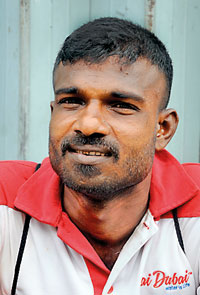
Nihal Nishan
Shop owners grumbled because Customs released mostly perishable items during the work-to-rule. P Madawaraj, a wholesale merchant, said first there was a goods shortage. “But now that the union action is over, all the consignments will get cleared at once,” he said. “There will be several containers of dried fish, and sprats and even more containers of potatoes and onion. How do I stock them?”
The only option, Mr Madawaraj said, was to sell his wares at lower prices to clear the backlog or he would have to pay even more for his held-up goods.
Minister Samaraweera was strongly criticized by lawyer and public interest litigant Nagananda Kodituwakku, who said he was responsible for billions of rupees in losses caused by the Customs action. Because of his removal of Mrs Charles, importers paid demurrages to companies and sustained other losses. The Customs’ unions got their demand, but others suffered heavily.
Mr Kodituwakku said the Minister should not expect importers and businessmen to meet the cost of heavy demurrages or the re-export of goods that became unsuitable for consumption owing to his actions.
Mrs Charles has instructed her officers to work around the clock to clear the backlog. The situation should return to normal by Monday, a senior Customs official said.
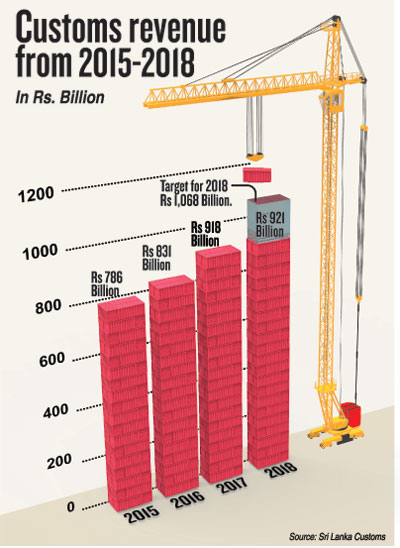
Customs probes will continue, says reinstated DG
By Chris Kamalendran
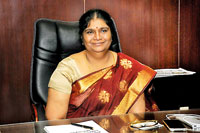 Emerging strong and unscathed after her controversial removal and successful reinstatement, Customs Director General Sarojini Charles has reiterated that the investigations she had started into alleged frauds will be continued uninterrupted.
Emerging strong and unscathed after her controversial removal and successful reinstatement, Customs Director General Sarojini Charles has reiterated that the investigations she had started into alleged frauds will be continued uninterrupted.
Stressing the need to expedite the investigation, she told the Sunday Times, “We will continue the investigations. We have not stopped them. I will continue from where I left.”
She, however, declined to name the specific investigations and those who were involved.
Ms. Charles said that although only some of the investigations were highlighted, the Customs, on a daily basis, launched about 10 to 15 probes.
The director general said that not only probes on alleged Customs frauds, but internal disciplinary inquiries were also proceeding, with the trade unions extending their full support.
When asked about reports of the country losing billions of rupees in revenue due to the Customs trade union action launched in protest against her transfer, Ms. Charles said there was no official estimate about the revenue losses caused by the work-to-rule campaign which lasted five days. She expressed the hope that the Customs would be able to recover the dues in three to four days.
When asked about the issue over importers being forced to pay additional demurrage charges though it was not of their making, the director general said she was hopeful ofresolving the issue through discussions with the importers and officials.
Ms Charles said that they were able to achieve only 87 percent of the Rs 1,068 billion revenue target set for last year, because the political crisis and the exchange rate issue had an impact on the quantity of goods being imported.
“We will put our maximum effort to achieve the target,” she said.
On combatting drugs, she said they had an assurance from the government that a special marine division would be set up.
| Backlog bad for business Nearly 1,500 containers of food were held up in backlog midweek but cleared up yesterday, a spokesman for the Association of Food Importers and Wholesale Traders said. “It was very bad for business,” said Rajendran Gnanasampanthan, the Association’s President. “Each day a container sits in the port, the cost to the importer is between US$ 8 and 16, depending on its size. Things like chickpeas, when they remain in a container in this heat, needs fumigation after a few days.” The disrepute between Customs trade unions and Finance Ministry should have been resolved faster without impacting importers. Nearly 250 wholesale shops in Pettah also joined the hartal in support of Customs trade unions. The manner in which issues were handed by the trade unions and Government set a bad precedent, said Chrisso de Mel, Chairman of the Sri Lanka Shippers’ Council. As a public institution, Customs unions should have taken their grievances to other forums before resorting to a disruptive, ad hoc, work-to-rule campaign. They should have considered the impact to the country and public. Actions such as these impacted significantly on importers and exporters. Demurrages and delays in processing paperwork is often the difference between meeting an order on time and suffering significant losses. On-time delivery was crucial in this day-and-age. Mr de Mel felt Customs must be declared an essential service. The work slowdown imposed additional costs on both importers and exporters, said W A Wijewardena, economist. Delays in Customs clearance have had a temporary negative impact on them. “Customs is a revenue sensitive agency and, therefore, any decline in its productivity affects the revenue targets of the Government, on the one hand, and imposition of additional costs on economic agents, on the other,” he said. “Hence, it is a man-made negative shock on the economy.” However, since the trade union action was contained to a limited timeframe, it will not have a permanent negative impact on the economy, he said.
Mangala hits out at business mafia controlling Colombo port Finance Minister Mangala Samaraweera said he had withdrawn the Cabinet paper promoting Customs Director General P S M. Charles to a position in the ministry. “A normal administrative division taken at the ministry last week has been turned in to political issue by the opposition,” he claimed, at a press conference this week. Flanked by Mrs Charles and Finance Ministry Secretary R H S Samarathunga, the trio presented a united front after several days of turmoil at the Customs Department. The Minister praised Mrs Charles saying she was “an iron lady”. He had only wanted her to man a new unit that was overseeing all revenue services under his ministry. A “business mafia” controlled the Colombo Port, Mr Samaraweera said. While Mrs Charles had served with distinction, someone who could instill “discipline” in the Port as needed. He defended his decision to replace her with a senior ex-Navy officer. “The best example is the pepper, dyed tobacco leaves and areca nut export business, where we lose so much of revenue,” the Minister said. There was leakage of Customs revenue and the Department needed reform. Ex-military officers are serving the country well in public and private sector roles, and even representing Sri Lanka as diplomats, he argued. The failure to achieve Customs revenue targets led him to remove Mrs Charles, he continued, adding hastily that it wasn’t the Director Generals’ fault. Last year, the Department was set a target of Rs 1.068 trillion but achieved only 87% or Rs 921bn of it. Minister Samaraweera dismissed allegations that a staff member had tried to influence Mrs Charles over an investigation. The loss of revenue caused by the work-to-rule was yet to be calculated, he said. The Government will not waive demurrage costs. “Ask the Customs trade unions to pay them,” he said. The Customs Ordinance is outdated and needed amendment. The Minister vowed to restructure the Department to reduce corruption and bump up revenue. New measures were being planned in this regard. They include a special committee to investigate corruption headed by a retired judge, automation of the Customs Department’s paperwork and installation of new drive-through scanners to enhance surveillance, compliance, revenue raising and security. The Minister expressed disappointment that Customs had only caught 5% of narcotics taken into custody in 2018. Mrs Charles, meanwhile, pledged to continue investigations into the pepper and dried betel nut re-export irregularities and vehicle import rackets. She will submit the outcomes to the Ministry within two months, she said, asserting that a preliminary report has already been sent.
|

